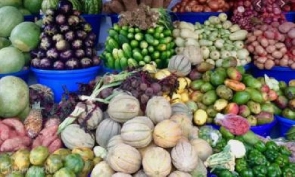 File Photo: According to CSIR, GMO products have been on supermarkets shelves for the past six years
File Photo: According to CSIR, GMO products have been on supermarkets shelves for the past six years
Dr Ibrahim Atokple, a former Breeder at the Council for Scientific and Industrial Research-Savanna Agricultural Research Institute (CSIR-SARI) has said Ghanaians are already eating Genetically Modified foods (GMOs).
He said for about six years now, GMO products had been on the shelves in supermarkets across the country, adding “Anybody that is eating imported soybean oil is consuming GM food.
The insulin, which is used to protect the diabetic is a GMO product, which is infused directly into the bloodstream. Once you are consuming pito (a locally-brewed drink), you are eating a GMO product because the yeast that causes the fermentation is GMO.”
He said this when briefing journalists on the CSIR-SARI’s BT Cowpea project during a tour of the confined field trials of the BT Cowpea at Nyankpala in the Tolon District of the Northern Region on Wednesday.
The CSIR-SARI’s BT Cowpea project seeks to amongst others come out with a variety that can withstand the maruca pod borer pest, which is a troublesome pest that destroys cowpea fields, to ensure increased production. Dr Atokple therefore urged the citizenry to disabuse their minds that GM foods are not safe.
The CSIR-SARI has concluded research activities on the BT Cowpea and the National Varietal Release Committee of the Ministry of Food and Agriculture will soon assess the variety and decide whether or not to recommend it to the Minister of Food and Agriculture to release it for commercial production in the country.
A section of the public has always resisted the cultivation of GMO foods in the country with the argument that it was dangerous to human health and would lead to the extinction of local seeds.
GMOs are derived through crossing different genes of living organisms. However, Dr Atokple, who was the first Principal Investigator on the CSIR-SASRI’s BT Cowpea project, emphasised that “GMO products have come to stay, because the poultry that we are importing from Europe are being fed with Soybean GMO products from Brazil and the United States, and these come to us and we eat. So, we are already eating GMOs.”
He added that “As at last year, over 300 million hectares of land were planted using GMOs. So the world is not free of GMOs.”
He clarified that GMOs were not toxic, neither were they dangerous to human health, saying “If there is any food or any crop variety that is extensively tested in terms of toxicity and allergenicity; they are GMOs. This is done according to regulations to ensure food safety.”
He explained that “The moment we eat any food, the digestive system produces enzymes that will break down the protein or the gene into a form that will be used by the body. So, it is not toxic.”
Dr Atokple said “What we need to do is; what comes into the country, what research are we doing and how do we regulate it for our safety? Mr Christopher Akai, Director, Plant Protection and Regulatory Services, Northern Region, spoke about the confined field trials of BT Cowpea saying “Looking at the plant, it tells you that we have gained in terms of yields, which will translate into higher incomes for farmers.”
Mr Akai said “We all know that maruca pod borer is one of cowpea’s troublesome pests and once it occurs in your field, you have no chance of harvesting maximally. So, if the trial will be better off performance wise, why not. We should be calling all farmers to adopt it.”
He expressed the hope that the BT Cowpea would soon be deregulated for farmers to cultivate in the country for increased yields and incomes for farmers.